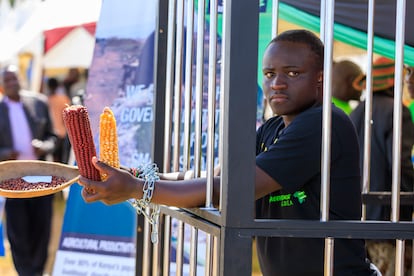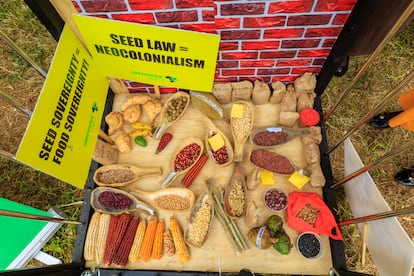African farmers demand their right to plant indigenous seeds, banned in six countries.

The 2014 harvest proved disastrous for Francis Ngiri, a farmer in Makongo, a small town in southern Kenya . The El Niño storm was particularly severe that year, with torrential rains that flooded millions of hectares, including the millet and chickpea fields Ngiri grew with certified seeds purchased from an agribusiness company. To cover the cost of the seeds and their associated inputs (chemical fertilizers and pesticides), Ngiri had taken out a loan, which he was unable to repay after the meager yields from his land that fateful season.
Disillusioned and bankrupt, Ngiri decided to return to the indigenous seeds that African farmers have been saving or acquiring for centuries through barter and informal trading. He had already done so, taught by his father, before temporarily switching to intensive farming. In addition to returning to his old-fashioned farming, Ngiri created a native seed bank in 2015, which, he proudly explains via videoconference, now houses 124 varieties.

In theory, their repository should serve solely as an anthropological curiosity or a museum of ancient agricultural practices. Under the law (the original regulations date back to 2012, with subsequent updates), exchanging or trading uncertified seeds—those without property rights because they don't belong to anyone—is prohibited in Kenya. Punishments range from fines of 240 euros to prison terms of up to two years. “There have been no arrests yet, either due to a lack of political will or the discretion of farmers, but the danger is there,” Ngiri explains. A common loophole to circumvent the law, he continues, is for uncertified seeds to be offered in the form of grain, that is, as direct food.
He and 14 other farmers have embarked on a legal battle to overturn the most punitive sections of Kenyan law. “How can we not oppose a type of regulation that prevents us from preserving our biodiversity?” asks Ngiri, who says the final hearing in the legal process took place in May and the trial itself is expected to begin in September. Greenpeace's Elizabeth Attieno summarizes the core of what the courts will decide: “The right of farmers to plant whatever they want, whenever they want.”
Five other sub-Saharan countries also prohibit their farmers from using indigenous seeds. According to a recent report by the Alliance for Food Sovereignty in Africa (AFSA) and other organizations such as Swisaid, this is the case in Tanzania, Malawi, Namibia, Chad, and Sierra Leone. On paper, even giving away uncertified seeds is a crime. In Europe, such strictness is found in two countries: the United Kingdom and Belarus. And in all of Asia, it is only in Pakistan.

One of the authors of the AFSA report, Simon Degelo, asserts that they have analyzed legislation across the continent and that, whether or not the laws are being enforced, after reading it, "it is crystal clear" that the free circulation of native seeds is prohibited in these six states. Even so, Aggie Konde, vice president of AGRA, the main lobby in favor of intensive agriculture in Africa, denies the main implication: "In no African country is the exchange of indigenous seeds prohibited; only the intellectual property of improved seeds is protected," a common expression referring to certified seeds, which have usually undergone some form of genetic modification. Asked again after Konde's statements, Elizabeth Attieno of Greenpeace was astonished: "Do you really have nothing better to say than to deny the obvious?"
Beneath this legislative harshness lies a bitter debate about the future of agriculture in Africa . The discussion pivots around food security, which, according to AGRA and other proponents of agrochemicals, will be permanently threatened if the continent does not move toward a more intensive model. Few question that, under normal circumstances, certified seeds produce better harvests, at least in terms of quantity. The vice president of AGRA points out that, according to the data her organization handles, indigenous varieties "yield 70% less than improved ones," while the latter "only cover 30% of African fields."
Identity nexusThe equation becomes more complicated if we add other factors such as production costs or resilience. “Take the example of corn. Local [seed] varieties can yield 300 kilos per hectare, and certified vitamin-enriched varieties, 1,200 kilos,” says Samuel Arop, head of Farm Africa in Uganda, an NGO operating in several countries on the continent and advocating a “dual approach.” “The problem,” Arop continues, “is that you have to buy certified seeds every year, you need inputs for them to perform well, and they are more prone to pests and the effects of climate change than indigenous seeds, which are better adapted to specific ecological zones.” To further fuel the conversation, Arop points out that communities’ attachment to “seeds that have been passed down from generation to generation and contain a strong component of cultural identity” creeps into the conversation. Konde settles this last question with a pragmatic approach: “I’m not sure our ancestors would like Africans to suffer from malnutrition.”
Although they make no secret of their preference for agroecology and their rejection of the chemical/GMO tandem in crops, AFSA, Greenpeace, and others insist on shifting the debate back to the mere right to choose. Degelo emphasizes that he doesn't get involved in "which of the two options is better." His interest lies in warning about draconian legislation that prevents "farmers from choosing what they consider best for them."
Regarding the reasons for criminalizing the use of traditional seeds, Degelo observes a mix of "ignorance and external interests," with the struggle for the agricultural narrative in Africa hovering over the actions of national parliaments. "The politicians who pass these laws are often very far removed from the reality of the countryside and frequently buy into the idea that indigenous seeds are bad and outdated. Meanwhile, agribusiness companies and lobbies do their job very well by inviting them to lavish events to train them in more efficient agricultural models," he maintains. "It's surprising to see signs of companies advertising certified seeds at the headquarters of our agricultural institutions," adds Kenyan farmer Francis Ngiri.
For Edwin Baffour of Food Sovereignty Ghana, preventing farmers from using seeds unless they were generated in a laboratory (usually thousands of miles from Africa) is absurd and exacerbates the continent's dependence. "Any day now, the US or another country could abruptly halt seed exports to Africa. What would we do then?" he argues. According to Baffour, there is also something abhorrent about the privatization of natural processes: "Seeds are a common good, like rain, sunshine, or the air we breathe."
EL PAÍS




